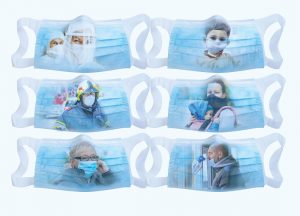“Health care providers are undoubtedly burnt out”

Ten months after the start of the Covid-19 pandemic, the toll of physical and emotional exhaustion can be felt by every healthcare professional. However, they continue to save our lives or, at least, to do the best they can despite the situation and resources at hand.
In April, we had the opportunity to speak with Nurse Practitioner Jennifer da Cruz, in order to understand the situation at a time when everything was still very unclear and essentially new. Ten months later, we are once again speaking with her to hear the experiences of someone who is living “in the eye of the storm.” How are health professionals holding up while living in this constant struggle? How are their spirits? How are they doing with resources and support?
A conversation that makes us clearly realize that although these professionals are absolutely exhausted, they continue to give us the best they can and know. As for the rest of us, we simply have to respect them and comply with the preventive measures that are requested.
Milénio Stadium: Tell us how the last 10 months have been. Professionally, what changes have you felt?

Jennifer da Cruz: The last couple of months have been difficult in healthcare. With the consistent rise in cases, hospitals find themselves overwhelmed with the amount of work being placed on health care providers. Health care providers are no longer compensated if required to quarantine or feel ill, which places a larger burden on healthcare providers who are not only responsible to take care of the sick but to also take care of their own, their family. Without proper supports in place, burn out can be felt far and wide. Professionally, I feel overworked and overwhelmed but with the support of my coworkers, family and amazing friends, we have managed to push through these difficult times together.
MS: How have the spirits of health professionals in hospitals been?
JDC: As mentioned before, health care providers are undoubtedly burnt out. Given that we are all sharing a common living experience when it comes to working within healthcare during a pandemic, we rely on each other to vent about both the good and the bad. As I, many are hoping for the days when the burden within the healthcare system will begin to lighten. We are all hopeful that we will one day be laying on a beach, with a drink in our hands looking back on these very difficult times and never taking a second for granted.
MS: During the pandemic, has there been a time when you were afraid to be working in a hospital?
JDC: Luckily, I have been fortunate enough to work with an absolutely amazing team on a unit that has been secluded from emergency rooms or other accompanying units on site which has helped immensely with keeping patients, visitors and staff safe throughout this time. With a large supply of PPE always provided, amazing teamwork, and proper safety precautions, this has all helped decrease my anxieties in regards to any fears of contracting the virus or potentially bringing it home to others.
MS: We’ve entered the second wave and are back to the lockdown. Do you feel that this is due to the public’s lack of responsibility or was it inevitable?
JDC: With the enormous increase in testing capacities alongside the immense increase with the number of cases within our communities, a second lockdown seemed to be inevitable. With an ever increasing amount of research, funding, testing and studies, I sincerely hope that all of us as individuals take the time to stay informed and work together towards fighting this together, decreasing the number of cases and ultimately keeping ourselves and the ones we love supported and safe during this time.
MS: Do you believe that health professionals have felt supported by the government?
JDC: Unfortunately, many health care workers do not feel supported by the government. As health care workers, we are given the responsibility to take care of the sick, in every regard, from head to toe without the same regard for the care taker – the healthcare workers. Unfortunately, if health care workers are exposed to COVID-19, they are simply expected to get tested and if negative, simply “monitor our symptoms” and return to work to the same exposures and risks. Also, as mentioned before, if a health care provider contracts COVID-19 they are not compensated for their time to quarantine, a little ironic isn’t it? With an evident burden of taking care of patients during a pandemic, health care providers are being placed with even heavier burdens in continuing to provide care to sick patients despite our high-risks of contracting the virus and lack of support if we ourselves fall ill.
Catarina Balça/MS








Redes Sociais - Comentários